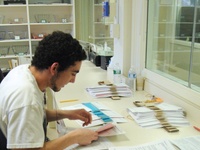Some worked—in a company that makes video games, in a rock climbing gym, on a UPS delivery truck, in a neuroscience lab full of monkeys, and on Capitol Hill, to name a few jobs. Some volunteered for charities aiding refugees, cancer patients, and citizens of impoverished nations. Many of them traveled. Collectively, the students interviewed for this article visited 35 countries, spanning every continent but Antarctica.
“I’ve ridden a camel in Timbuktu. I feel like life is complete now,” says Elizabeth M. Letvin ’13.
William N. Forster ’13 says that the sauteed grub intestines that he ate in a remote Ecuadorean village during his gap year tasted “better than the armadillo.”
Nearly all of the students say that their gap years were extremely rewarding and that they would recommend the experience to other incoming college students.
Johnny F. Bowman ’11 says he was “pissed off” when he first learned he had been Z-listed.
Multimedia
But he says that that feeling changed once he saw the possibilities afforded by an extra year between high school and college.
“Once I realized I can do whatever I want to do, it was the most mind-opening realization and subsequent experience of my life,” Bowman says.
Many students say that taking a gap year gave them a chance to unwind after working assiduously throughout high school, and that spending a year away from academics changed their perspective on college.
“Every day I say ‘Yes! I’m at college! More college today!’” says Novey, who worked on a congressional campaign during his gap year and then became a congressional staffer when his candidate won the election. “You could go weeks without seeing a girl your age in D.C. It teaches you to appreciate that you have a built-in social scene.”
Others say their year off allowed them to discover academic interests that they didn’t know they had.
For example, Quentin Z. Auerbach ’11 says that the culinary interest which he developed by taking cooking classes during his gap year led him to choose food policy as the topic of his social studies thesis.
Asher M. Lipson ’12 had never studied French before traveling to France during his year off. Now, he’s concentrating in Romance Languages and Literatures, a decision he says he doubts he would have made otherwise.
A LEGACY LIST?
While Z-listed students bring a wide range of interests and experiences to Harvard, many people charge that they are similar in two ways—the Z-list has long had a reputation for consisting predominantly of affluent students and Harvard legacies.
Of the 28 students interviewed by The Crimson for this story, 18 have parents who attended Harvard. All but four receive no financial aid from the College, while about 70 percent of the student body receives aid from Harvard.
Read more in News
VES Department Creates New Painting Professorship













